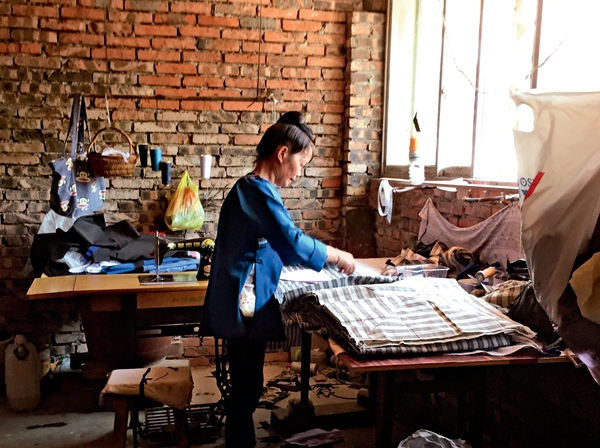Atlas design: Giving new life to Chinese crafts
- By Anna Sowley
 0 Comment(s)
0 Comment(s) Print
Print E-mail China Today, May 9, 2017
E-mail China Today, May 9, 2017
|
|
|
Lie Jia, producing traditional fabrics in Guizhou. [Photos courtesy of Atlas Design] |
An Atlas moth hangs framed in suspended animation on the wall of a small design studio hidden down a Beijing alley, its silver-tipped wings gleaming in the afternoon light. The silk produced by this huge moth is said to have contributed to the world's first architecture: carpets. It's a good starting point for a company devoted to design, hence the name "Atlas Design." The founding members of the company have a genuine interest in carpets – a future project is in the pipeline – but they are also intent on creating what they call a "design atlas," preserving design heritage and amassing a collection of craft techniques to be used in future innovations.
Atlas Design came about when three alumni of Rhode Island College of Design decided to pool their respective skills and start a design company in Beijing. It made sense, explained co-founder Catherine McMahon, because "Beijing is still the cultural capital of China. People who have invested in traditional Chinese design are either in Beijing or Hangzhou." Catherine formerly worked for a consulting firm in Shanghai dealing with the societal impact of new technology, Jenny Chou contributed to disaster reconstruction by working for renowned architect Hsieh Ying-Chen from Taiwan, and Ahti Westphal did regional planning and park management in Cambodia. "We all have the same core education," Catherine explained, "but because of our life experience we all have completely different skills."
The company has three strands weaving towards the realization of their "design atlas." As trained architects, interior design work and building design is their bread and butter, but their research interests lie more in the field of crafts and cultural heritage. The second strand involves cultural preservation and social enterprise – the desire to help others keep their traditional craft culture alive. The third strand is teaching, which Catherine does by lecturing at the Chinese Academy of Fine Arts (CAFA), and which the studio does collectively by putting together workshops and educational programs showcasing traditional crafts.
Crafting social enterprise
The studio has a connection with a group of ethnic minority Dong women from the tiny mountain village of Dali in Guizhou Province, southwest China, who produce handwoven fabrics. When Atlas first visited the place, all the members of the team were stunned by the area's natural beauty – the greenery, the rich red earth, the sheer magic of the place – and how "spatially dynamic" it was. The surrounding hills must be constantly farmed in order to grow the crops that the village depends on. "There is an intense relationship between humans and nature," Catherine observed during her visit. "It takes many generations of people contributing to make a place that strong – and to destroy it could be so quick."
The village was in need of something more than just farming. Guizhou's government is progressive in terms of eco-development, and invests in cultural preservation – but villages this remote are often the last to see any of the cash. Atlas teamed up with the Global Heritage Fund to create an "evolving social enterprise model" which will benefit women of the village and their families as well as preserving their traditional craftwork. The local government has since turned their attention to Dali, and plans are in the works to increase tourism to the region. But in terms of local enterprise, it is the women who are forging the way.
"There was no organization around the textiles," Catherine commented on the women's weaving. "Really not commercial. It's all personal." The craftspeople are mostly middle-aged or older women. Their skills won't be passed down to younger generations because they are not seen as economically advantageous. Traditionally, it was always men who did business – women's work was not seen as marketable. Atlas helped develop a model whereby the valuable cultural heritage of Dali's craftwork can be preserved and utilized in a wider context, while earning money for the village and giving women's work economic value.






